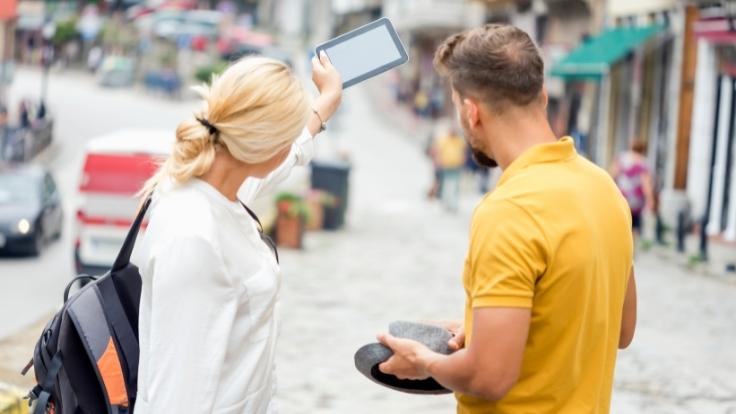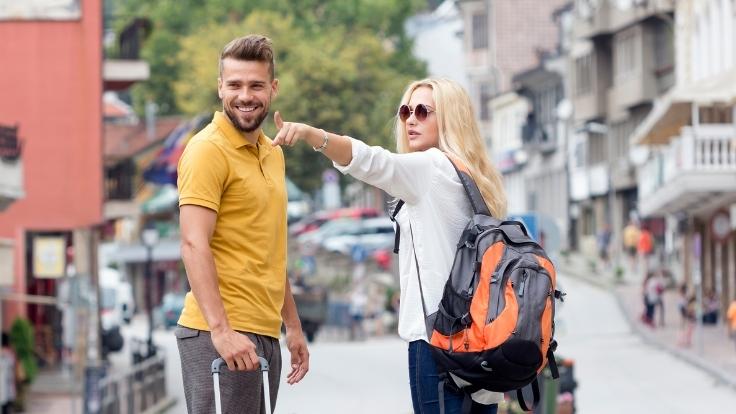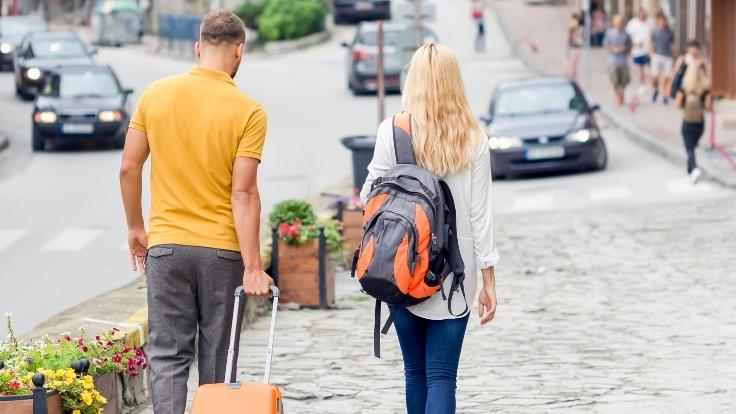This summer is shaping up to be a busy one for vacation travelers. With COVID in the rear-view mirror, it’s time to venture out for a proper vacation. Soak up the sun, stay by the sea. Backpack through Europe.
It’s high time to make those vacation plans. But before you get lost in your dreams, make sure you know how to stay safe online while you travel. The tips below can help you with cyber safety.
📋 DISCLOSURE – This page has affiliate links. If you buy something through one of these links, I may earn a commission at no cost to you. Read more here.
Summer Travel Plans?
A report in Travel Agent Central estimated 75 percent of Americans will travel the country for summer vacations. Despite spiraling inflation, sky-high airfares, and record-breaking gas costs. And they’ll bring along their digital devices.
According to a travel survey by The Vacationer, more than 20 percent of Americans will travel abroad this summer. Despite concerns over Russia’s invasion of Ukraine. And they’ll carry their devices with them.
Online fraud and identity theft are common crimes against travelers. In-country and abroad. How can you secure your digital data and stay safe online while you travel for vacation?
Let’s find out.

Stay Safe Online While You Travel
There are things you can do to stay safe online while you travel. But first, consider your digital devices. Cell phone, laptop, tablet, personal digital assistant (PDA), and other mobile devices.
Decide which ones you will need on vacation. If you can do without a device, leave it at home. In fact, don’t take any information (account numbers, contact information) you won’t need on your trip.
When that’s done, it’s time to make your devices safe from hackers and prying eyes. Here are 15 ways to stay safe online while you travel for vacation:
📋 DISCLAIMER – I am not a cybersecurity expert. The content on this page is for general information only. It is not a substitute for professional security, financial, or legal advice.
1. Back Up Your Files
Back up all the information you will take on your trip, and keep the backups at home. In fact, it’s a good idea to back up your photos, messages, contacts, and other important items as often as possible. Save your backups to the cloud or a portable storage device.
2. Update Your Software
Now look deeper into your devices, especially if you didn’t do digital spring cleaning. Scan your devices for viruses, Trojans, malware, and adware.
Install the latest antivirus and security software on your devices. Update the applications that need updating, and uninstall any apps that waste space.
3. Secure Your Devices
Create strong passwords that combine numbers, upper- and lowercase letters, and special characters. Make them at least 8 characters long. Change your passwords at regular intervals during your trip – and again when you return home.
{ Need a secure place to store your passwords that will also protect your identity? Check out this password safe and companion travel case. }
Use strict security settings on your web browser, and disable any features you don’t need. Encrypt sensitive information where possible. In some countries, customs officials may not allow tourists to enter with encrypted data.
4. Use Extra Verification
Lock your online accounts behind two-step verification, or two-factor authentication (2FA). This extra login step offers an extra layer of security in case someone steals your password.
Biometric authentication is another possibility, if you choose to use it. This type of verification uses human characteristics (fingerprints, facial recognition) to identify you.
{ Note: While biometric data is less vulnerable to fraud and hacking, it’s not foolproof. It also raises important legal and ethical issues. Just something to consider. }
5. Track Your Devices
Make sure your devices have location tracking apps where possible. If a device becomes lost or stolen, you may be able to find it.
A remote wipe application is also handy. If your device falls into the wrong hands, you can wipe the device with a remote command to protect your data.
Most phones have built-in security measures that let you track, lock, or erase it with a remote command. Check your phone settings to enable this “Find My Device” feature.

6. Use a Burner Phone
Consider using a burner phone for travel. A cheap “throwaway” phone is a good alternative to the expensive iPhone or Android you use every day. A burner phone can protect your privacy and help you stay safe online while you travel.
In some parts of the world, mobile devices are lucrative prizes for local thieves. But if someone steals your burner phone, your important data is still safe on your main phone back home.
7. Limit Public Wi-Fi
Most people use public Wi-Fi connections now and then. But it’s smart to limit your use during vacation. Public networks are rarely secure, so they create easy targets for cybercriminals.
Be aware of who can see your screen in public places, and shield your passwords and other private data. Don’t use the “remember me” feature that many websites offer. Clear your web browser after each use, and end connections when they’re not in use.
8. Use a Virtual Private Network
If you must jump online in public, use a virtual private network (VPN). This gives you a secure connection over a public Wi-Fi network. And what you send over that connection has data encryption.
Airport and hotel networks are safer now than before, thanks to the prevalence of HTTPS. That last “s” stands for secure. But if you still feel exposed with a public internet service, use a VPN you can trust. Shop for one now.
9. Turn Off Bluetooth
Speaking of wireless internet, turn off your phone’s Wi-Fi signal when not in use. The same goes for mobile hotspots if you’re tethering to your laptop.
And don’t forget about Bluetooth (many people do). The general rule of thumb is to remove Bluetooth if you don’t use it. If you can’t remove it, then disable it.

10. Beware of Scams
Cybercriminals prey on summer travelers. Scams come through email, text messages, social media – and they can ruin your vacation. If an offer sounds too good to be true, it usually is. If it requires an upfront fee or wire payment, avoid it.
You already know about phishing scams, which use email to steal private data. But have you heard of smishing scams? SMiShing uses text messages – such as flight delay notifications – to steal personal data.
Even if a message looks real, go to the source (your airline or hotel). Don’t click on links or open attachments from an unknown source. Do this instead: Report fraud to the Federal Trade Commission. And forward the scam email to the bank or business it impersonates.
11. Avoid a Trap
Speaking of scams, never trust something that someone left behind. For example: a phone charger or USB cord. What looks like a typical connector might actually be a trap.
The charger or cord could be a means to infect your device with malware. It could compromise your device the moment you plug it in. Stay safe online while traveling and use your own cords and chargers.
12. Don’t Overshare
If you use social media, don’t post about your vacation while you’re on vacation. This is good practice before you leave on your trip as well as during your getaway.
Otherwise, people will know your home is empty – and you don’t want that. Wait until you’re home again before you share vacation pictures and stories online.
13. Shop Safe Online
When you shop online, make sure the store’s website uses secure technology. Check that the web address (URL) begins with “https” rather than “http.” And look for a tiny locked padlock symbol on the checkout page.
HTTPS indicates that the website uses a Secure Sockets Layer (SSL) Certificate. This tells you that your data has encryption as it leaves your browser for the site’s server.
14. Guard Your Cards
If you plan to use debit or credit cards, don’t let them out of your sight. Use a secure network connection for all transactions. Keep an eye on your cards during your trip – and back at home, when unusual transactions may pop up.
Apple Pay, Google Pay, and Samsung Pay are three alternative payment options. These digital services use random numbers, called tokens, instead of card numbers. Their built-in security features can help you stay safe online while you travel.
15. Seek Security Alerts
Before you leave for vacation, check for cybersecurity alerts. The United States government publishes official alerts here and here. You’ll find general travel alerts here and more online safety tips here.
Wrapping It Up
Travelers leaving for vacation pack the right clothes and supplies before they hit the road. Expert travelers are educated, prepared, and cyber-safe, too.
By following these tips, you will know better how to stay safe online while you travel. And that’s a step in the right direction for a smooth and enjoyable summer vacation. ◻️
Related Posts
- 12 Ways to Protect Yourself From Common Holiday Scams
- Bran Castle: The Famous Dracula Castle in Central Romania
- Public Wi-Fi Networks: 10 Tips for Safer Public Web Surfing

Now It’s Your Turn
Thank you for reading my post. Now it’s YOUR turn to chime in. Where will you travel for summer vacation this year? What is your best online safety tip for travelers?
Let’s fill the comments with friendly conversation. Scroll down to leave a reply, ask a question, or just say hello. And if you liked this post, please give it a share.
Blessings, Annette
📋 SUBSCRIBE – You are reading “15 Ways to Stay Safe Online While You Travel or Vacation.” Join my email list and be a part of the Savoring Home community.
Photo Sources
- Taseffski / Getty Images Signature | Canva | License
Reference Sources
- Malwarebytes Labs
- National Counterintelligence and Security Center
- National Cybersecurity Alliance
- World Nomads
